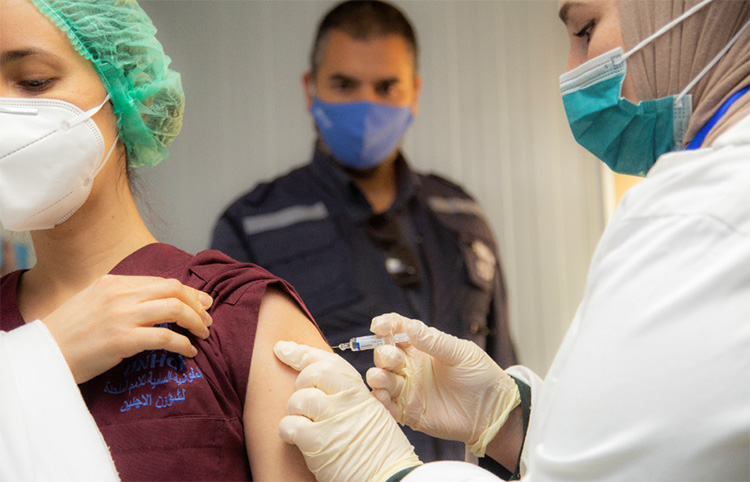 Syrian refugees in Jordan are vaccinated against COVID-19. Photo: WHO/Banan Saad
Syrian refugees in Jordan are vaccinated against COVID-19. Photo: WHO/Banan Saad
8 February 2021 – While 2020 was a unique and challenging year for the Eastern Mediterranean Region, 2021 has provided a glimmer of hope as vaccines for COVID-19 are rolled out.
As part of the COVAX Facility – a global mechanism led by WHO, Gavi and the Coalition for Epidemic Preparedness and Innovations (CEPI), for fair and equitable distribution of vaccines for COVID-19 around the world – over 37 000 vaccine doses of the Pfizer vaccine will reach the most at-risk and vulnerable people living in the occupied Palestinian territory, and almost 94 000 doses will reach Tunisia for the most at-risk and vulnerable people in mid-February.
Currently, the Pfizer/BioNTech vaccine is the only vaccine under the Emergency Use Listing (EUL) of WHO, with other vaccines in the pipeline for review in the coming weeks and months.
An additional 46 to 56 million doses of AstraZeneca/Oxford vaccines are anticipated to be available during the first half of 2021 for people living in 20 countries in the Eastern Mediterranean Region, namely Afghanistan, Bahrain, Djibouti, Egypt, Islamic Republic of Iran, Iraq, Jordan, Lebanon, Oman, Libya, Morocco, Palestine, Pakistan, Qatar, Sudan, Saudi Arabia, Somalia, Syria, Tunisia, and Yemen.
“As the first vaccines are rolled out by WHO and partners, we are working hard to make sure that the most vulnerable people in our Region are vaccinated first, with the rest of the population planned for vaccination rounds later this year. This is welcome news for us, and for thousands of people who are at most risk of infection. As vaccines start rolling out, opportunities to flatten the curve of the pandemic across the Region are more likely to happen,” said Dr Ahmed Al-Mandhari, WHO Regional Director for the Eastern Mediterranean.
In parallel, many countries in the Region have also taken steps to protect their populations by approving several COVID-19 vaccines for emergency use through their national regulatory authorities.
Vaccination campaigns have been ongoing in 9 countries of the Region since the beginning of the year, targeting high-risk groups, including health workers, people over the age of 60, and people with underlying health conditions. So far, over 2.9 million doses of various vaccines have been administrated in the United Arab Emirates, Bahrain, Saudi Arabia, Oman, Kuwait, Jordan, Egypt, Qatar and recently in Morocco. On 14 January 2021, Syrian refugees living in Zaatari camp in Jordan were vaccinated, making Jordan one of the first countries to vaccinate refugees.
WHO’s Regional Office for the Eastern Mediterranean tracks vaccine use, regulations and other developments in countries of the Region and provides technical support as needed.
However, vaccinations only work when they are effectively combined with public health strategies. These strategies include isolation and quarantine, tracking and tracing, as well as effective communication.
While vaccines offer a flicker of hope, we are also faced with a reality today that we cannot ignore – many countries are continuing to see an increasing number of cases and deaths; new variants of COVID-19 are being reported in several countries around the world, and people who are not adhering to prevention measures are still being infected and infecting those around them.
It will be a long time before every single person is vaccinated. Until this pandemic ends, we urge countries in our Region to continue taking all necessary measures to prevent the virus from spreading and causing more deaths. And individuals need to continue practising physical distancing, staying home if asked, and following all the measures that are put in place to keep ourselves safe.
“Vaccines alone will not end the pandemic and they won’t solve everything,” stressed Dr Al Mandhari.


